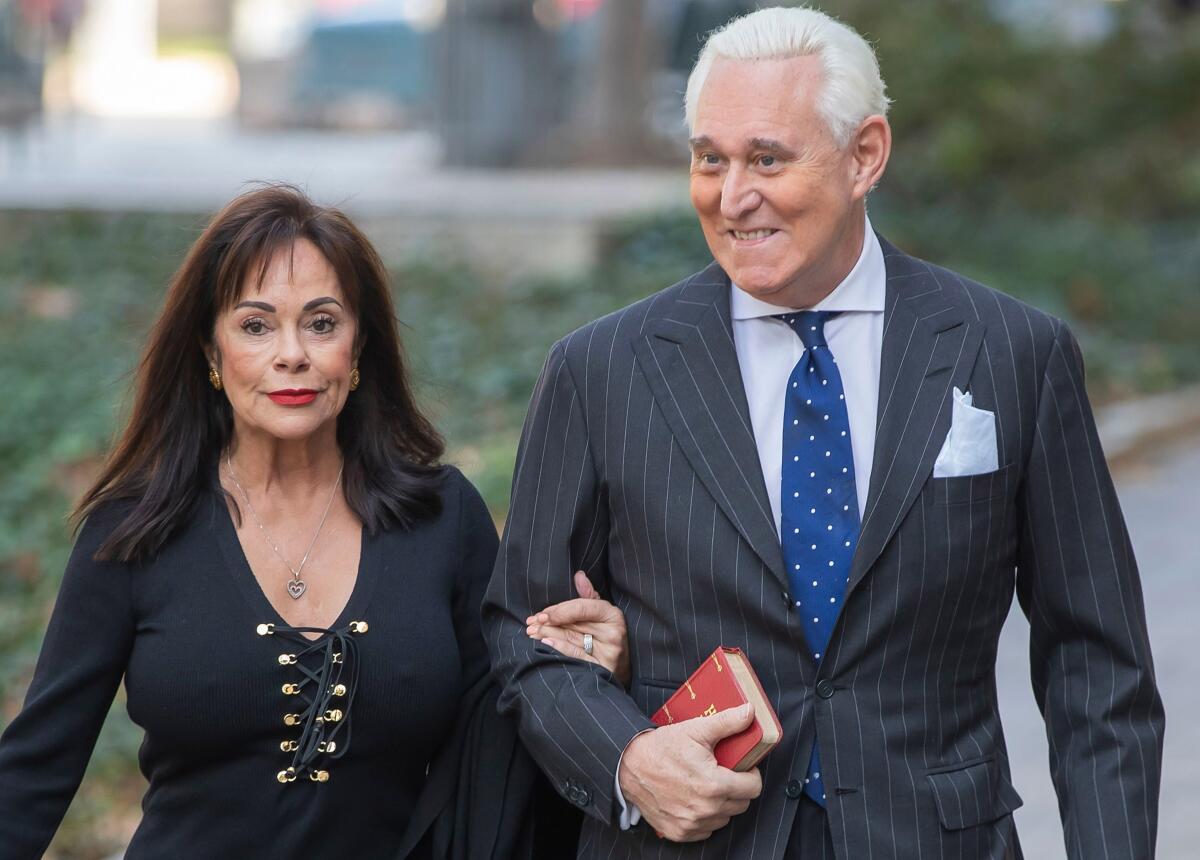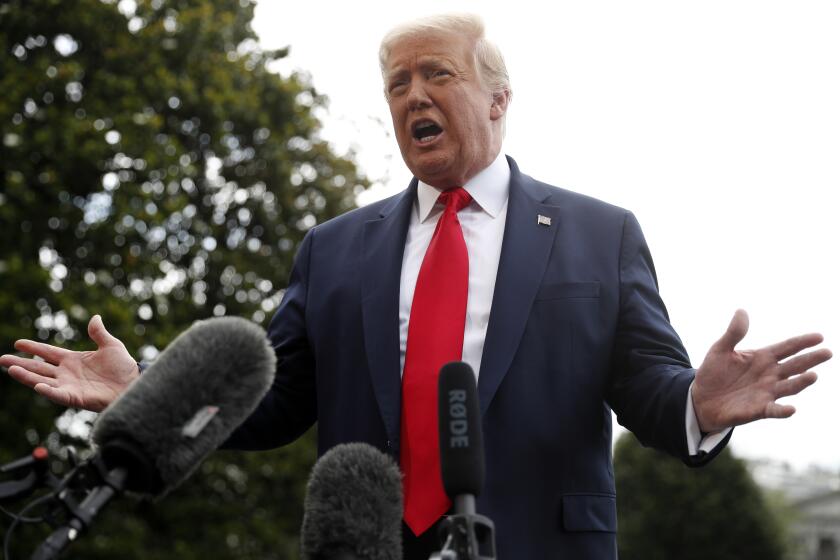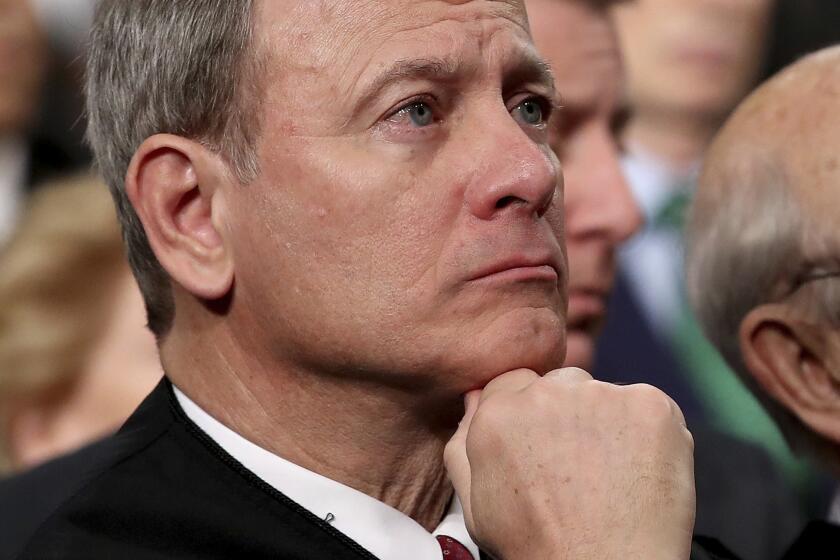Trump commutes prison sentence for Roger Stone

- Share via
WASHINGTON — President Trump has commuted the prison sentence of Roger Stone, a longtime confidant and Republican operative who was found guilty last year of seven felony counts, including witness tampering and lying to Congress during the Russia investigation.
Stone was to report to prison on Tuesday to start serving 40 months behind bars.
“Roger Stone is a victim of the Russia Hoax that the Left and its allies in the media perpetuated for years in an attempt to undermine the Trump Presidency,” White House Press Secretary Kayleigh McEnany said in a statement. “There was never any collusion between the Trump Campaign, or the Trump Administration, with Russia.”
She said Stone, 67, would be at “serious medical risk in prison.”
Trump had long argued that Stone was improperly targeted by federal prosecutors, and he repeatedly hinted that he would grant clemency to Stone.
“I’ll be looking at it, “Trump had told reporters earlier Friday. “I think Roger Stone was very unfairly treated, as were many people.”
Trump’s reelection campaign, once expected to be a juggernaut, is adrift as it faces unexpected challenges unique to this extraordinary election year.
Unlike a pardon, a sentence commutation does not erase the conviction. It leaves the felonies on Stone’s record but allows him to avoid prison. Stone has remained unrepentant.
The decision marks the latest effort by Trump and his administration to undo the work of former special counsel Robert S. Mueller III, who successfully prosecuted several members of the president’s inner circle as part of his investigation into Russia’s interference in the 2016 election.
Stone’s case became a focus of concerns about political meddling in criminal cases after Atty. Gen. William Barr overruled his own prosecutors in February and requested a lower sentence for Stone. Four career prosecutors withdrew from the case, one of whom quit.
Barr, however, signaled in an interview with ABC News this month that he disagreed with Trump and believed Stone should still spend time behind bars. “The prosecution was righteous, and I think the sentence that the judge ultimately gave was fair,” Barr said.
Barr’s handling of cases stemming from the Russia inquiry has been controversial.
Chief Justice Roberts sends a message that the Supreme Court is independent and not an ally of one party.
In May, he asked a federal judge to drop the felony charge against Michael Flynn, Trump’s first national security advisor, even though Flynn had pleaded guilty to lying to FBI agents. That case is still pending.
Although Stone was convicted of seven felony counts and sentenced to more than three years in prison, he was free as he appealed his conviction. Witnesses at Stone’s trial said he communicated with Trump and other top campaign advisors during the 2016 campaign about WikiLeaks’ plans to release emails stolen from Democratic Party computers.
Prosecutors never established that Stone had coordinated with WikiLeaks, but they said Stone lied to the House Intelligence Committee to cover up his efforts and to protect Trump.
They said he also encouraged Randy Credico, a comedian and talk show host, to withhold information from lawmakers. Testimony from the trial cast doubt on the president’s written answers to Mueller, in which Trump denied recalling any conversations Stone had with him or his campaign about WikiLeaks.
“He was not prosecuted, as some have complained, for standing up for the president,” U.S. District Judge Amy Berman Jackson said at Stone’s sentencing. “He was prosecuted for covering up for the president.”
Stone worked in Republican politics for decades and famously has a portrait of Richard Nixon tattooed on his back. Over the years he developed a reputation as a dapper and quotable purveyor of political dirty tricks.
During the Watergate era, he donated money to a Democratic campaign in the name of the “Young Socialist Alliance” and then leaked the information to a local newspaper to embarrass his opponents.
“I’ve always made it clear that I practice hardball politics, but I draw the line at breaking the law,” Stone told The Times in 2018.
Stone found a kindred spirit in Trump, who gained political influence by promoting false claims that President Obama wasn’t born in the United States, and he worked for years as an informal political advisor to Trump.
Stone left his official position in the Trump campaign in 2015 under acrimonious circumstances, but he continued to speak with Trump and some of his top aides. As Mueller began to build a case against Stone, Trump publicly praised him for not cooperating with prosecutors, calling him “very brave.”
“There is evidence that the president intended to reinforce Stone’s public statements that he would not cooperate with the government when the president likely understood that Stone could potentially provide evidence that would be adverse to the president,” said a recently unredacted portion of the Mueller report.
Stone appealed for a pardon even as the jury was deliberating at the end of his trial, working through Alex Jones, founder of the conspiracy website Infowars.
Jones delivered what he said was a message from Stone on his radio show.
“Alex, barring a miracle, I appeal to God and I appeal to your listeners for prayer, and I appeal to the president to pardon me because to do so would be an action that would show these corrupt courts that they’re not going to get away with persecuting people for their free speech or for the crime of getting the president elected,” Stone said, according to Jones.
Trump appeared to agree with that sentiment, tweeting after the jury pronounced Stone guilty that Stone may have been subject to “a double standard like never seen before in the history of our Country.”
Trump’s use of his clemency power has stirred controversy before.
He overturned the conviction of Joe Arpaio, the former Maricopa County, Ariz., sheriff who was found in criminal contempt for violating a federal court order to stop racially profiling Latinos.
In November 2019, he cleared three soldiers accused or convicted of war crimes after heavy lobbying that included appeals on conservative media. And he pardoned Dinesh Joseph D’Souza, a conservative writer who had been convicted of campaign finance violations.
More to Read
Get the L.A. Times Politics newsletter
Deeply reported insights into legislation, politics and policy from Sacramento, Washington and beyond. In your inbox twice per week.
You may occasionally receive promotional content from the Los Angeles Times.













